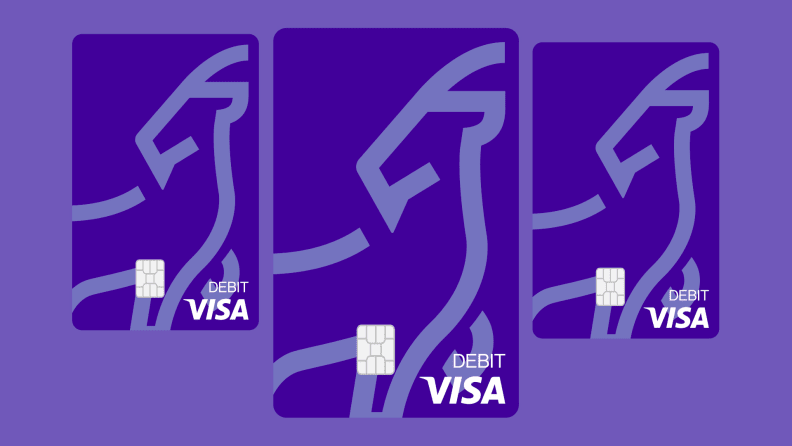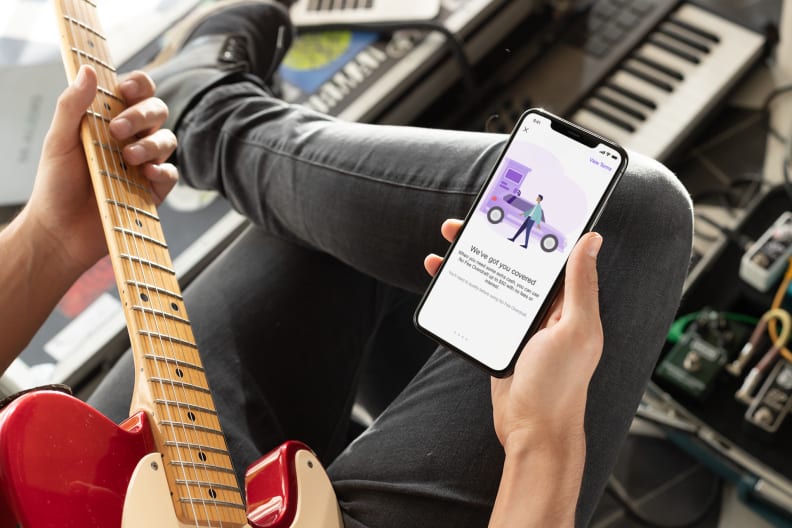This online savings account offers one of the highest interest rates around
Varo might pique your interest.
 Credit:
Getty Images / GaudiLab
Credit:
Getty Images / GaudiLab
Recommendations are independently chosen by Reviewed's editors. Purchases made through the links below may earn us and our publishing partners a commission.
The days of pulling up to the bank and sending a deposit through the vacuum tube may soon be a thing of the past—even for boomers.
During the coronavirus pandemic, 46% of baby boomers, 39% of Gen Xers, and 35% of millennials have turned to new methods like remote banking to manage their money. And 31% of consumers say they will continue using mobile wallets and other contactless payment methods post-COVID-19.
Varo is one of several companies that offers online-only bank accounts with no fees. We say company because, at the moment, Varo—like Chime, Simple, and other competitors—is not technically a bank. Varo bank accounts are provided through the Bancorp Bank, though in June 2020 Varo announced that its own national charter is on track to be approved this summer.
If you decide to stash your cash in an online account, it’s important to feel confident that your money is safe and that you can access it quickly. Below we discuss Varo products, how to get money in and out of the accounts, and how it stacks up to other options.
What are Varo’s online banking terms?
These fees and interest rates are subject to change. But at the time of publishing, here are the fees, rates, and terms you should know about:
- Minimum balance required to open: None
- Monthly fee: None
- Overdraft fee: None
- ATM fees: None at 55,000 no-fee Allpoint ATMs; $2.50 for out-of-network ATMs
- Foreign transaction fee: None
- Bank account APY: 0.00%
- Savings account APY: Up to 2.80%

Who can open a Varo account?
Permanent residents and U.S. citizens who are 18 years or older with a Social Security number can open an account. To sign up for the app, you need an iPhone running iOS 10 or greater or an Android running OS 5.0 Lollipop or greater.
You're also eligible even if you've been denied a checking account in the past, perhaps due to unpaid balances or identity theft. Varo offers second-chance banking without the usual monthly fees, and the company does not look at applicants' reports from ChexSystems, a consumer reporting agency that many other banks consult.
What products does Varo offer?
At the moment, the company offers two accounts—a regular bank account and a savings account. Both are FDIC-insured through the Bancorp Bank. This means that the money in your account is insured up to $250,000 should the bank fail.
The savings account earns 1.21% APY if you have a balance greater than $10,000. You earn 2.80% APY if your balance is less than $10,000, and you meet these requirements:
- Make at least five card purchases a month
- Receive direct deposits totaling $1,000 or more each month
- Maintain a daily balance below $10,000
If you’re looking for other banking products, such as personal loans and credit lines, you’ll have to wait a bit longer. They’re in the works, according to a representative, and may launch when the bank charter process is complete.
What fees does Varo charge?
Like most online-only banks, Varo’s main selling point is that you can manage money without worrying about nuisance fees that are common at big banks. Customers don't pay any monthly maintenance fees, foreign transaction fees, overdraft fees, or replacement card fees.
But you may encounter merchant fees if you go to a retail store to deposit cash into your account; more on that below.
What features are available with Varo?
- Office hours seven days a week: You can contact customer support through email, or call Monday through Friday, 8 a.m. to 9 p.m. EST (excluding federal holidays), and Saturday and Sunday, 11 a.m. to 7 p.m. EST.
- No-fee overdraft: You can overdraw your account by up to $50 without a fee as long as you use your debit card five times per month and receive a payroll or government direct deposit of over $1,000 in the same month. Varo will take the amount of your overdraft from your next deposit. If you turn the no-fee overdraft feature off, your card will simply decline anytime you try to make a purchase that will overdraft your account.
- No-fee instant transfers to other Varo customers: Say you want to transfer part of the cable bill to your roommate who’s also a Varo customer—you can instantly send money in the app and at no cost.
- Early direct deposit: You may be able to get your paycheck up to two days faster if you set up direct deposit. Although, the fine print says the exact deposit timing depends on when your employer processes the payment.
- Account lock: If your card is lost or stolen, you can lock your account in the mobile app.
- Check send service: Customers don't receive a checkbook, but you can make a request in the app for Varo to send free checks out on your behalf.
- Partner perks: You'll find insurance, credit-building, saving, and cash-back offers from partners such as Clearcover and Self.

How do you deposit and withdraw money?
You can put money in the account by depositing a check via mobile deposit, setting up direct deposit, or transferring from an external account for free.
There’s also the option to deposit cash using Green Dot Reload at one of more than 90,000 retail stores. While Varo doesn’t charge a fee for this, the merchant can charge $4.95 for a cash deposit or up to $5.95 for a Moneypak. So, if you're someone who frequently makes cash deposits, this feature may get in the way of some of the other conveniences that come with online banking.
To use the money in your account, you can make a purchase with your debit card, transfer money to another Varo user, transfer money to an external account, or request to have Varo write a check for you.
What security and protection does Varo offer?
The debit card is covered by Visa's Zero Liability protection, which means you may not be held liable for unauthorized card purchases as long as you immediately report them. The app also uses 256-bit AES encryption technology to protect your data.
How does Varo stack up to other online banks?
Varo doesn’t pay out any interest on its bank account for everyday spending. To be fair, interest isn’t very high on bank accounts whether you do business with a brick-and-mortar bank or an online bank.
The company does, however, come in at the top for interest on savings; you get 1.21% APY if the account balance is more than $10,000, and 2.80% if it’s less than $10,000—more than double what competitors like Ally Bank, Simple, and Chime offer.
If you were to keep a daily account balance of $9,000 with Varo—and met the few other conditions to earn the 2.80% APY, like using your debit card once or twice a week—you’d earn around $250 in interest in one year. Stash that same amount at a big bank with an average rate like 0.06%, and that’s about $5 after 12 months.
Another area where Varo stands out is the lack of a foreign transaction fee, similar to Chime. Ally Bank, however, charges up to 1%, as does Simple.
What drawbacks does Varo have?
Varo only offers a bank account and savings account for now. You can’t do domestic or international wire transfers, and there’s no joint account so you won’t be able to manage money in one place with your significant other. There’s a chance that’s changing soon, since Varo plans to expand offerings once the national bank charter is approved.
You'll find automatic saving tools, like rounding up transactions to the nearest dollar and transferring the spare change to your high-yield account. But the app doesn’t appear to have some of the useful money management features that Simple has, such as built-in bill tracking and goal-setting.
So, should you open a Varo account?
Whether or not Varo will be best for you depends on your banking habits. If you’re looking forward to in-person banking post-pandemic or you need access to wire transfers and physical checks, Varo may not be for you.
On the other hand, if you’re looking for a straightforward no-fee account for everyday transactions, and an above-average savings APY, this could be a sound solution. Travelers, in particular, may find no foreign transaction fee comes in handy when worldwide travel restrictions are lifted. And the same goes for those who've had trouble with their accounts in the past, thanks to Varo's second-chance banking.
The product experts at Reviewed have all your shopping needs covered. Follow Reviewed on Facebook, Twitter, and Instagram for the latest deals, product reviews, and more.



